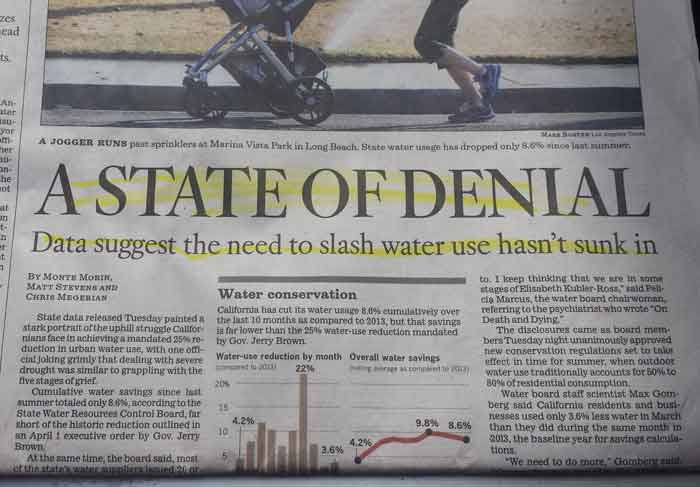|
 Last week, California’s State Water Resources Control Board approved rules forcing cities to limit watering on public property and encouraging homeowners to let their lawns die. Figures released only 2 days earlier revealed that water use statewide had only decreased 4% in March compared to the same month in 2013. This is far short of Governor Jerry Brown’s desired savings of 25% statewide. Last week, California’s State Water Resources Control Board approved rules forcing cities to limit watering on public property and encouraging homeowners to let their lawns die. Figures released only 2 days earlier revealed that water use statewide had only decreased 4% in March compared to the same month in 2013. This is far short of Governor Jerry Brown’s desired savings of 25% statewide.
At a time when dead lawns are encouraged, some say many Californians, especially in the southern areas of the state, are in denial about the drought. High end neighborhoods and estates in prestigious zip codes still have green lawns. Yet, what these property owners don’t yet know could catch them off guard.
One industry observer has reported to ALCC that “everyone is convinced that if those other people use less water, they don’t have to do anything themselves. Yet, they are frightfully close to being actually OUT of water.” Newspaper coverage also suggests that by and large, southern Californians are in denial. As long as the faucet runs, things are good.
ALCC’s source also reports he has heard unofficially from someone within a southern California water district that they are being asked not to reveal any water news that might cause public panic. In general, there appears to be lack of outreach within some communities to encourage people to conserve. Meanwhile, the Sierra snow pack is only 20% of normal.
Another Colorado industry source reported during a recent drive through central California, "It was heartbreaking to see the effect the drought is having on farmers and landscape companies. We saw brand new homes with only weeds because they were not allowed to install grass and landscaping. Right next door, their neighbors who built a year earlier have fully landscaped yards.”
They also saw groves of trees still producing Cuties and Halos alongside dried up fields of grape, fruit and nut orchards. Signs in front of dry fields simply say, “NO WATER/NO JOBS.” Last year, California’s ag industry – the largest producer of any state - lost $2.2 billion and more than 17,000 seasonal and part-time jobs.
No water, no lawns, no jobs. Drought is serious. What does it mean to an industry that relies on water?
ALCC recently polled members statewide about whether the drought 3 states away is influencing them and their customers. Stay tuned for results of that poll – and more discussions about how Colorado’s green industry might learn from its peers in drought states in order to be prepared for inevitable water shortages in our own future.
Read more in this issue of Colorado Green NOW:
Drought watch: Is landscape industry poised for pain or profit?
Affordable Care Act and defining seasonal workers
Early season strategies to keep your team upbeat and focused
Turf wars underway over robotic lawn mower
|


 Last week, California’s State Water Resources Control Board approved rules forcing cities to limit watering on public property and encouraging homeowners to let their lawns die. Figures released only 2 days earlier revealed that water use statewide had only decreased 4% in March compared to the same month in 2013. This is far short of Governor Jerry Brown’s desired savings of 25% statewide.
Last week, California’s State Water Resources Control Board approved rules forcing cities to limit watering on public property and encouraging homeowners to let their lawns die. Figures released only 2 days earlier revealed that water use statewide had only decreased 4% in March compared to the same month in 2013. This is far short of Governor Jerry Brown’s desired savings of 25% statewide.
